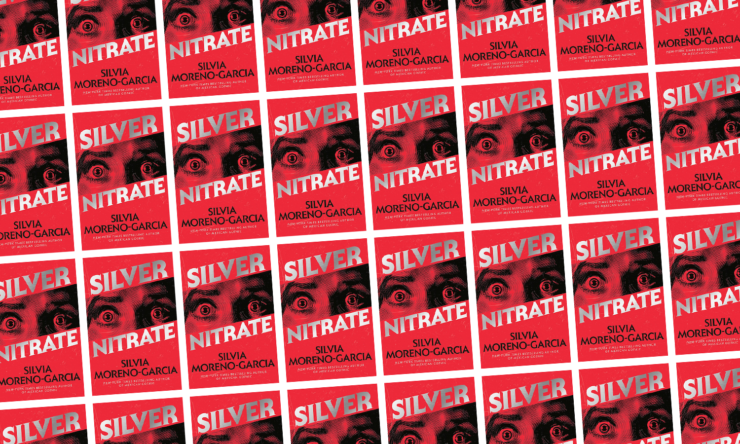There’s something to the liminal semi-permanence of physical media that in and of itself feels ripe for narrative exploration, especially through the lens of historical horror. A film reel, a manuscript, a cassette tape: tangible objects, thought and vision translated into the approximation of a physical medium. A tangible object imbued with a soul, or something like it. With that physicality comes fragility: As powerful as it is to make the imagined manifest, it also means making it breakable. Add into the mix the real-life peculiarities of the film industry—namely, the eponymous prized film stock discontinued for its catastrophic combustibility—and you have the ingredients for a compelling magic story that perhaps only Silvia Moreno-Garcia could execute with such taut brilliance.
A master at atmosphere, she excels at highlighting real-world horror through lush, specific, inventive storytelling. She balances her stories like an alchemist, weaves the threads of her plot expertly around her characters and setting, making for an airtight read that nevertheless knows when to breathe. Moreno-Garcia knows how to craft character dynamics that charm, madden, and anchor the reader. The dual points of view of her leads makes it feel at once the most natural and miraculous thing that it’s these two finding themselves in a mess of film magic and real monstrosity.
Montserrat is a talented sound editor, clever, stubborn, and prone to hyperfocus. She tends to come off cold due to protective and necessary self-reliance. Tristán is a handsome, half-washed-up former soap star, Sensitive, needy, not infrequently the sort of casually cruel that can come with lifelong beauty and the prickling awareness of its impending decline.
They met as children, Tristán the only kid in their building who didn’t tease Montserrat for her limp. Now, both of them aged thirty-eight, their careers and friendship have settled into something lonelier than either hoped. It’s 1994 in Mexico City, and Montserrat is more talented than her industry wants a Mexican woman to be, especially one who genuinely cares about her work. No matter her substantial skills, she will never get the chances of a white man. And Tristán’s career hasn’t been the same for a decade, not since the accident that cost him fame, his unblemished looks, and his well-connected ex-girlfriend. Biracial Lebanese and lighter skinned, he’d had a real shot that he hadn’t quite managed to take. Montserrat confessed her feelings for him a long time ago, and, avoiding the matter, he’s kept her leashed at arm’s length, yanking her close when he wants closeness. Through a tangle of codependency, real care, and messy blurry best friend boundaries, they’ve built their own devotion. They’re both stubborn, terribly real disaster bisexuals, and it’s a joy to watch them wound and want each other.
When the once-legendary cult horror director Abel Urueta moves into Tristán’s building, both Montserrat and Tristán are drawn to him. He made a name for himself in the 1950s world of film noir, when audio was a new invention and the industry had far fewer regulations. That era and its complicated legacy lay over the text in irrevocable palimpsest.
Buy the Book


Silver Nitrate
Still, when he reveals that he wants them to help him finish his final film, it sounds absurd. Urueta speaks of a man who was once a friend of his, a magnetic occultist who was able to imbue the silver nitrate in the film itself with magic. But like many European men in pursuit of power in this era, Ewers was a Nazi. Selfish to the marrow and ruthless about it, he speaks with seductive manipulation: exploiting the women and men of color in his life, making them feel chosen while he does. Now, Urueta wants their help to finish the film and lift the decades-old curse that Ewers ensured lingers in its incompletion. It’s about the synchronicity, Urueta explains—they need the audio. He needs Montserrat and Tristán.
Somewhere between humoring an old man out of pity and well, what do we have to lose, they agree. And wildly, at first it seems to work. Not only does Urueta’s luck change, so do theirs. Until Tristán’s past comes back to haunt him, and Montserrat finds more within Ewers work than she expected.
This is one that, if you can, feels extra right to read in print. The magic system is so cool, so deliciously believable. The thin line between chemistry and alchemy. The spell a story weaves. How surreal and world-opening the first films must have been, especially with the addition of sound—how unearthly to hear a machine present a trapped, repeatable facsimile of a human voice.
Moreno-Garcia explores how colonialism and appropriation might manifest in magic—how it would, how it already does, really. How racism and exploitation would affect access and the execution of any spell the way it influences every industry. There is not a resource on this earth that belongs to people of color that a cruel white man would not exploit, including, obviously, their own bodies. The foil for this evil Nazi eugenicist magician being this badass bisexual underestimated Mexican sound editor who surrounds herself in thorns and yet is furiously in love with her infuriating best friend—she understands his medium better than he does. She respects it, she’s mastered it, and she genuinely adores it. Of course he tries to use her. Of course he underestimates her. And of course she’s used to powerful white men doing exactly fucking that.
Silver Nitrate’s magic is a brilliant evocation of the mundane shot through with the divine (or the infernal, the mythic, the absurd). Nebulous yet anchored, it pulls from the darkest reaches of one’s psyche, from wretched guilt and selfish hope. It’s blunt, but not a tidy thing. It ripples. It bleeds from its source like radiation. Lingers behind the eyes like an afterimage. Silver nitrate film is said to have produced some of the most powerful experiences of viewing cinema. More vivid contrast, brighter whites and darker blacks, a deft tool for a cinematographer, an intimacy that must have felt especially uncanny to early audiences. Like all good magic, it comes with a risk and a price: Not only is it highly flammable, its specific chemical composition means its combustion process generates its own oxygen—it cannot be extinguished by water alone.
It’s not easy to execute alternating dual points of view that enhance rather than deflate the atmosphere, but Moreno-Garcia does it so elegantly in a way that seems at once purposeful, fluid, and comfortable to read. She crafts an inviting intimacy with her flawed, fascinating leads that makes the experience irresistibly sleek. Such a perfect portrayal of a hero as not a chosen one, not an everyman or right time/right place, but someone using who they are and what they have to fight how only they can. Puzzle pieces clicking into satisfying place. It’s extremely effective, serving as another layer of this book’s shimmering magic. It comes down to what, and who, you believe in. It comes down to power and access: to have it after being so long denied. To hunger for it beyond remorse.
Also, I need to emphasize: This is some of the sexiest a book without sex can get. These two are some of my favorite characters this year. Moreno-Garcia captures the warring wants, irritations, and needs between them, waxing and waning there beneath their gestures and conversations. A viciously capable woman, self-centered in the sexy way usually reserved for angsty white boys. A needy, beautiful decaying façade of a man. Nearing the end of their thirties with strings of slutty memories and no one making an impact on them as much as each other. You don’t need to have a weakness for that sort of thing for the dynamic to work; it works.
Silvia Moreno-Garcia is one of the greats of our time. Silver Nitrate is another example of work that understands its genre well enough to pack a perfect punch in the direction of an audience often sidelined, and once again, it’s a knock-out. Homage and send-up at once and a marvel at all of it. Reading this one feels like a triumph.
What is magic? Writing your own story—and returning to it for revisions when you’ve figured out how to make it right for the person you’re ready to become. The specific love in your life, friendship and community and making a home of each other. Sleek, suspenseful, brown and bisexual as hell, Silver Nitrate haunts in the best way. A soft yet searing wonder.
Silver Nitrate is published by Silvia Moreno-Garcia.
Maya Gittelman is a queer Fil-Am and Jewish writer and poet. They have a short story forthcoming in the YA anthology Night of the Living Queers (Wednesday Books, 2023). She works in independent publishing, and is currently at work on a novel. Find them on Twitter (@mayagittelman) or Instagram (@bookshelfbymaya).










